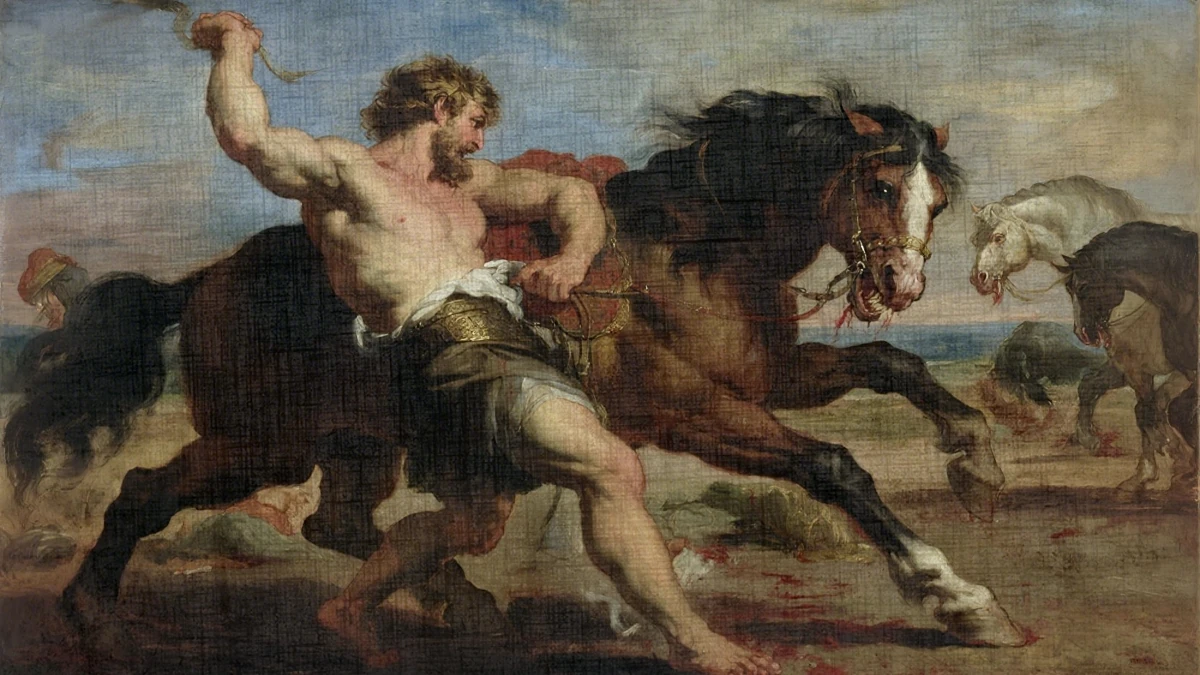Once again, Eurystheus commanded Heracles to embark on a distant quest—this time to seize the horses of Diomedes, king of Thrace.
For the first time in his service to the king, Heracles hesitated. He had feared neither the Nemean Lion nor the Hydra, neither endless wanderings nor arduous labor, neither bloody battles nor human treachery. But this task seemed unworthy of a hero—to take by force or stealth what rightfully belonged to another would make him no better than a thief or a brigand.

With a heavy heart, he set out for Thrace, consoling himself that the long journey would grant him time to ponder his course.
The Interlude in Thessaly
Heracles arrived in Thessaly, in the city of Pherae, ruled by the virtuous King Admetus, beloved of Apollo.
Long ago, the god of light had committed murder in his wrath, and as punishment, Zeus condemned him to serve a mortal for a year. Apollo chose Admetus, tending his flocks and blessing his kingdom with prosperity: the earth yielded bountiful harvests, his herds multiplied endlessly, and peace reigned in Pherae.
Yet greater than any wealth was Admetus’s queen, Alcestis, whom Apollo had helped him win. Her father, Pelias, had demanded that suitors yoke a lion and a bear to a chariot to claim her. Apollo subdued the beasts, and they obediently drew Admetus’s chariot to Pelias’s hall. Alcestis became his bride, and they lived in joy, raising children.
When Apollo’s servitude ended, he petitioned the Moirai, the Fates who spin the thread of each mortal’s life, to spare Admetus an early death—if another would willingly die in his stead.
Alcestis’s Sacrifice
When Hades sent Thanatos (Death) for Admetus, none—not friends, servants, nor even his aged parents—would take his place. Only Alcestis stepped forward:
“My love, I go gladly to death for you. Life without you is no life at all. Promise me but this: never bring another woman into our home.”
Admetus vowed. Alcestis donned white robes, lay upon her bed, and awaited Thanatos. As her breath faded, the palace and city mourned. Men sheared their hair and horses’ manes; a grand tomb was built outside the walls.
Heracles’s Intervention
Unaware, Heracles arrived as a guest. Though grief-stricken, Admetus honored the sacred laws of hospitality, housing him in the palace before departing for the funeral.
Feasting alone, Heracles grew merry with wine and chided a dour servant: “Why such gloom? Drink with me!”
“It is ill to revel when the house mourns,” the servant replied—and revealed Alcestis’s fate.
Heracles’s heart burned with resolve. He rushed to the tomb, ambushed Thanatos as the specter approached, and wrestled him until Death yielded Alcestis’s spirit.
Returning to the palace, Heracles led a veiled woman to Admetus: “Take this prize I won in combat. Let her console you.”
Admetus recoiled: “I swore never to remarry!”
Heracles unveiled Alcestis. The king trembled—had he not buried her that very day?
“Fear not,” laughed Heracles. “Death surrendered her. Be happy!”
Joy swept Pherae. But Heracles, content, sailed onward to Thrace.
The Mares of Diomedes
Sailors warned him of King Diomedes’s cruelty. The tyrant lured strangers to his seaside fortress, boasting of his four mares—fire-breathing, iron-chained beasts fed on human flesh. Unwary guests were led to the stables and devoured.
Now Heracles’s doubts vanished: destroying these monsters and their master was a hero’s work.
Landing in Thrace, he rallied the boldest sailors, routed Diomedes’s army, slew the king, and fed his corpse to the mares. He then shipped the creatures to Eurystheus, who released them into Arcadia’s Lykaion Mountains, where wild beasts tore them apart.